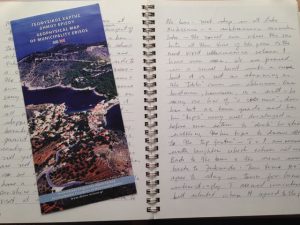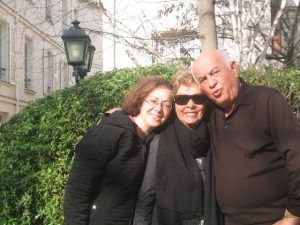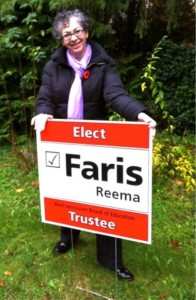Posts Tagged ‘women’
A Life In Script
I feel the absence of my mother most keenly when I catch a glimpse of her writing.
When I look at the carefully crafted words and sentences she moulded; the ones she wrote down. An alchemy of thought, energy, effort, pen, and paper.
Mom used writing to express her thanks. To scold political leaders. To extend congratulations. To advocate for causes. To nurture connections.
She cherished the handwritten note even after her grandsons helped her learn to use email.
My mother believed there was a personal quality to a handwritten note that was impossible to replicate in type form. I agree. Each stroke of the pen captures a person’s personality, their character, history, and experience. The way in which hand-written words create a web of meaning is the most affirmative statement of “I am here”. When I catch sight of my mother’s writing script I wonder how it is that she is not here.
How can the person whose heart propelled the pen across the page not be here to cross that t and dot that i?
I feel the absence of my mother most keenly when I see her writing, with an intake of breath and a vise clamped around my heart.
My mother’s script is from an earlier era when education had not been commodified and contorted. When it was a gift to learn. A time when writing was valued not only for its content but for its form. When penmanship spoke of culture and education and, yes, privilege.
That script, her unique cursive style, is undeniably and uniquely my mother, Yulanda.
I feel the absence of my mother most profoundly when I stare at her writing.
René Descartes said, “I am thinking, therefore I am.” My mother’s cursive script says, “I wrote, therefore I have been.” And as the ability to recall her physical presence becomes the dream of time lapsed, her writing will remain forever real and tangible.
As her daughters, her children, and perhaps someday her grandchildren and descendants, we will carry her DNA forward in time. However, her letters, the drafts of her speeches, the thank-you cards, her recipes, the quotations she noted down, her signature — like the one in the volume of William Shakespeare’s collected works that she used for her studies at McGill — these all serve as a testament to her personal spirit.
No other hand shaped those words, no other mind developed those ideas, no one else forged those connections: letter to letter, person to person, heart to heart.
I feel the absence of my mother most keenly when I catch a glimpse of her writing. The words and sentences that flowed from the pen she held, the pen she guided into forever.
In the year and months since my mother died (and a month before what would have been her 79th birthday), my family has cried, laughed, and celebrated birthdays, anniversaries, graduations, and weddings. We’ve attended funerals. We’ve had time at home, we’ve been away together and separately. Time has carried us forward. It is life’s imperative.
And she, my mother, has been there with us. In each moment, in each thought, in each word.
She always will be.
“If we danced more and sang more, we’d be happier people.”
Yulanda M. Faris
July 2, 1937 – April 23, 2015
Make Your Own Choices This November
Here are the speaking notes from my presentation to a gathering of West Vancouver electors this morning about West Vancouver Citizens For Good Government (WVCGG) and the list of Council candidates which they’ve endorsed. These comments are not an exact transcript – they represent the structure, spirit, and intent of my remarks. I’ve made minor edits to the text prior to posting.
- Introduce self.
- What, in your view, is the biggest concern with local municipal elections?
- prompt for low civic engagement and low voter participation
- In 2011, only 23.7% of eligible voters in West Vancouver cast a ballot for councillors.
- With such low turnouts, it is helpful to have individuals and groups who support civic engagement and who try their best to increase voter participation.
- People like this morning’s host. There is one group in West Van in particular which plays a central role in local elections. Do you know which group that is?
- prompt for WVCGG
- When I say West Vancouver Citizens for Good Government, what’s your impression of how many people are involved with the group?
- According to the last census of 2011, West Vancouver has a population of about 43,000 people. According to information about the last election, also 2011, there were 30,754 eligible electors in West Vancouver.
- How many members do you think there are in WVCGG?
- At the October 22 meeting to endorse candidates, the Board of Directors — 16 people — put forward their recommendation and 140 members voted. That’s less than .5% of eligible electors.
- What are the challenges you see with this situation?

- So what is WVCGG?
- founded 1972
- their info says they are a “non-profit, non-partisan, and non-issue community group”.
- interest in ensuring that qualified individuals run for office and to increase voter engagement
- they interview candidates – but don’t post the questions they ask and deliberations are secret
- they hold a public all candidates meeting open to all West Van voters which is great
- and they endorse candidates – but they don’t say why
- once they’ve endorsed candidates, they accept funds from each and with that money conduct extensive advertising which includes a direct mail drop to each residence, something out of the reach of individual candidates — unless they decide to spend some serious money
- You can start to see why this might be a bit of a problem. Here’s the bigger issue.
- At the WVCGG endorsement meeting, the Board of Directors presents its recommendations prior to members voting. In essence what this does is create a situation where the members are voting on the Board of Directors recommended slate and not voting on the individual candidates.
- As former school Trustee Barry Lindahl says — Barry was voted for by the members despite not being put forward as a selection of the Board but that’s rare and proves the exception not the rule — as Barry says, the WVCGG process essentially becomes not about who is best, but who is blessed.
- When I ran in 2011, I was endorsed by WVCGG and I also remember writing a letter in support of them to the North Shore News. But I cannot support the list of endorsed candidates this year although I may support some of the individual candidates on the list because the list of endorsed candidates is very troubling to me.
- Here’s why?
- out of 6 endorsements for council only one is female this is despite the fact that there are more women living in West Van than men. 53% of residents are female and 47% are male according to the 2011 StatsCan figures.
- That’s not representative.
- But let’s say you don’t see that as an issue. Let’s put gender aside. What about incumbency? That’s usually an edge in municipal elections but there were two incumbents who weren’t endorsed.
- Incumbency ought not to be a guarantee, but here’s the thing. The only two incumbents who were not endorsed were the two incumbent female councillors, Mary Ann Booth and Nora Gambioli.
- WVCGG chose to endorse three first-time candidates — with relatively little experience of council — over the two incumbent female candidates.
- That doesn’t sit right with me. Elections ought to be about the best, not the blessed, especially not those blessed by a small group with undue influence no matter how well intentioned.
- I urge you to assess each candidate on your own terms and not someone else’s, when you vote this November.
- Thank You. Questions?
For more information on West Vancouver City Government, click here.
An Open Letter to the Premier of British Columbia
Dear Christy,
I hope you don’t mind me calling you Christy. We’ve never met, but you seem to pride yourself on connecting personally with British Columbians, so I’m sure you won’t mind my use of your first name.
I think it’s critically important for women to be involved in politics at all levels of government. I ran for the first time in 2011 and was honoured when the residents of West Vancouver elected me to be one of their trustees to the Board of Education.
Given my belief that women in politics are agents for change, it is with some hope that I viewed your election as leader of the BC Liberal Party and, subsequently, as Premier.
The opportunity to have a woman at the helm of the governing party seemed to me to be an opportunity to do things differently, to do things in a manner which is more collaborative and more substantive. To rise above partisanship and to focus on the overall good of our province and not merely to wallow in ideology.
Since then I’ve grown increasingly disillusioned by your approach to politics and governing.
Why?
Because rather than being an innovator in politics, you seem to be perfecting the art of politics by photo opportunity and soundbite rather than by policy and depth.
This is perhaps most evident in your approach to public education in our province and your reaction to the decision by Justice Griffin of the BC Supreme Court.
Essentially, Justice Griffin reaffirmed her earlier finding that legislation in 2002, enacted when you were Minister of Education, was unconstitutional and that the remedies subsequently introduced were insufficient.
This means that hundreds of millions of dollars that should have been invested in the public education system have been diverted. Not only that, but in the intervening twelve years, increases in costs, inflationary increases in conjunction with downloaded costs, have outpaced increases in funding which means that Boards of Education throughout BC have done more and more with less and less.
The continuing success of Boards should not be taken as an indication that funding is adequate. Rather, it is a testament to their resilience, and the resilience of all the partner groups including parents, that our students have continued to thrive and excel.
Imagine the success we would have had if you had maintained funding according to the terms of the 2002 collective agreement!
We would have had greater equity across school districts.
We would have more successfully addressed the needs of our most vulnerable students.
We would have kept more schools open.
To argue now, in light of the court judgement, that the solution is not affordable and that it will cause irreparable harm to students is to focus on being right rather than doing what’s right.
I’m confident that Justice Griffin was not counting on a time machine to carry us back in time and I recognize that filing an appeal is an option available to you in our legal system. I also believe the time has come for you to show leadership and to do things differently.
Negotiate a new contract with the BCTF, with new parameters for September 2014, and agree to provide the additional funding which will be required to fulfill the terms of a new agreement.
That, Christy, would reaffirm my belief in the power you have, as a woman in politics, to make a difference and, in particular, to make a difference which will undoubtedly benefit students in BC’s internationally recognized public education system.
Female Bullying: The Cruelty of Exclusion
“Even bullies wear pink shirts on pink-shirt day.”
I heard this sentiment expressed more than once this past week. And to a certain extent it’s true. It’s a day when we offer camouflage to those who don’t realize they are the bullies we’re talking about.
Even so, the day does shine a light on the topic. It inspires people to share their own experiences as Shane Koyczan has done this year with his spoken word poem (link below).
As my friend Bob has done on his blog.
And as I want to do here because sharing our stories helps to build awareness.
I won’t address overt bullying such as when the boys in high school taunted me with choruses of “areema, areema, areema” from the back of the class or a girl slapped me or another taunted me about the strap on my training bra.
I want to talk about the peculiarly female form of bullying which isn’t dealt with by initiatives such as pink-shirt day.
Why?
Because the majority of female bullying is insidious.
Women tend to organize in circles.* Girls refused entry into the circle or who have been dismissed from it are the ones, I would argue, who are often subject to bullying because they are isolated and excluded.
I was a new kid in Grade 8, my family having just moved to West Vancouver. Fortunately a strong friendship helped me survive the transition, but the friendship dissolved the following year and it was difficult to replace.
My memory of Grade 9 is one of tears: tears shed because I was always on the edge of the group. Sitting in the hall at lunch, for example, listening while the other girls made plans for the weekend and not being invited to participate.
Tears shed because I was alone.
In my second year at UBC, I joined a sorority. In hindsight, it may not have been the best fit for me. If being on the outside of the circle in high school is difficult, falling out of favour in a group of 40 or so is excruciating.
I remember carpooling with two of my sorority “sisters” although as I reflect on it today, I realize I must have done all the driving because I was the one with the car. On the way home one afternoon, we hatched a plan to get together later to watch a movie. I dropped them off and went home to get ready, sitting by the phone waiting for the call (yes, that’s how it was done in those days!). The call did come, but to cancel. Secrets are very hard to keep though and I found out later that the get-together had gone ahead as planned, but without me.
Trying to understand, I asked. The explanation? “Reema, when you ask someone how they are, you really mean it.” In other words, being with me was work. My interaction with others was based on more than a flippant line or light-hearted gossip or trivial talk.
I still am work and when I ask someone how they are, I still really mean it. My interest is in the whole person and their truth, not simply the mask presented to the world. I am a little too earnest to fit in easily and that has often put me, continues to put me, outside the circle.
But with the passage of time and the wisdom of experience, comes strength and acceptance, and a circle of true friends including that friend from Grade 8 whose friendship was reclaimed and a few from those sorority days.
It does get better, but it is never forgotten and it is not always easier.
Bullying requires constant and persistent vigilance, and that’s why it’ll never be eradicated simply by wearing pink one day a year.
*From the work of Deborah Tannen which I was introduced to in a writing workshop many years ago.
Three videos which touch the heart and mend the soul:
“It Gets Better” (Broadway sings for the Trevor Project)
It Gets Better – Royal Canadian Mounted Police (BC)
An informative interview on the topic of bullying:
Author Emily Bazelon on CBC’s Day 6
Why Women’s Rights Are An Education Priority
Here are some numbers I came across while preparing for an upcoming presentation:
- Women constitute 53% of the world’s population and own 1% of the wealth
- Women still earn 20% less than men
- In Canada, women occupy only 11% of the seats on corporate boards
- Of the 308 parliamentary seats in Canada’s House of Commons, only 68 (22%) are filled by women
- According to the New York-based Women’s Media Centre, only 3% of media decision makers are women
- In the 2010 Report on the Global Gender Gap issued by the World Economic Forum, which assesses criteria such as employment equity, health care, and political representation, Canada ranked #20 — a free-fall from #7 in 2005 — putting our country behind the US for the first time ever in terms of its treatment of the female population.
What does this all mean?
I think it means that even in our developed Western world, where gender inequalities are not as apparent as they may be elsewhere, there’s a lot of work to do in sustaining women’s rights and in working towards a better, more just society. There are worrying indications and further support to be found for this need in articles such as this one from The Globe & Mail on the reduction in the number of women appointed to the judiciary.
My focus here is not to talk about the broader social policy issues — at least not today — but I would like to address what I think this may mean in terms of educating young men and women, boys and girls.
Let’s look at what some consider the three levers of our modern society — money, politics, and the media — and some subject areas or topics which could be incorporated into or emphasized in the curriculum.
Money
On the premise that the more you understand money and how it works, the better you’ll manage your own financial situation. Are we teaching enough about:
- financial literacy and budgeting?
- economics and the history of financial economics?
- how to contend with the lure of consumerism?
Unless you learn why politics is important, how our system works, and its history, you’ll never see or understand the relevance to you and the world you live in.
- Why aren’t K-12 students exploring elections as they happen? In our community, students from Capilano University helped to run the All Candidates Meeting hosted by the West Vancouver Chamber of Commerce (Trustees were not included in the official proceedings). However, as far as I know, none of the municipal candidates were invited into schools to talk to students or to answer questions. If our intent is to improve the engagement of youth in the electoral process, why not take advantage of real life situations when they are current and relevant?
- Is the history of the struggle for women’s rights highlighted when Canadian history is being taught?
- Are biographies or autobiographies of Canadian women included on reading lists for social studies courses or even as examples of non-fiction in English or French language classes?
Media
It surrounds us, it influences us, it continually evolves and changes. In a recent CBC documentary, Naomi Wolf, author of The Beauty Myth, says she finds media images of women getting worse, reinforcing unrealistic expectations and norms. Are we doing enough to educate students about the media — advertising, movies, music videos, song lyrics, newscasts, etc. — and the influence it has on our behaviours and attitudes? Did you know that misogynist comments on-line are starting to drive female journalists and bloggers off-line according to a recent article in the UK newspaper, The Guardian. Women’s voices need to be heard and represented, not shrouded in the silence of earlier eras that would negate the work of great Canadians such as Henrietta Muir Edwards, Nellie McClung, Louise McKinney, Emily Murphy, and Irene Parlby. https://archives.cbc.ca/on_this_day/10/18/
There are many other ideas and initiatives we could pursue and explore. Paying attention to these three areas would be a start because the issue of women’s rights is an issue of human rights — not just abroad, but here at home.




